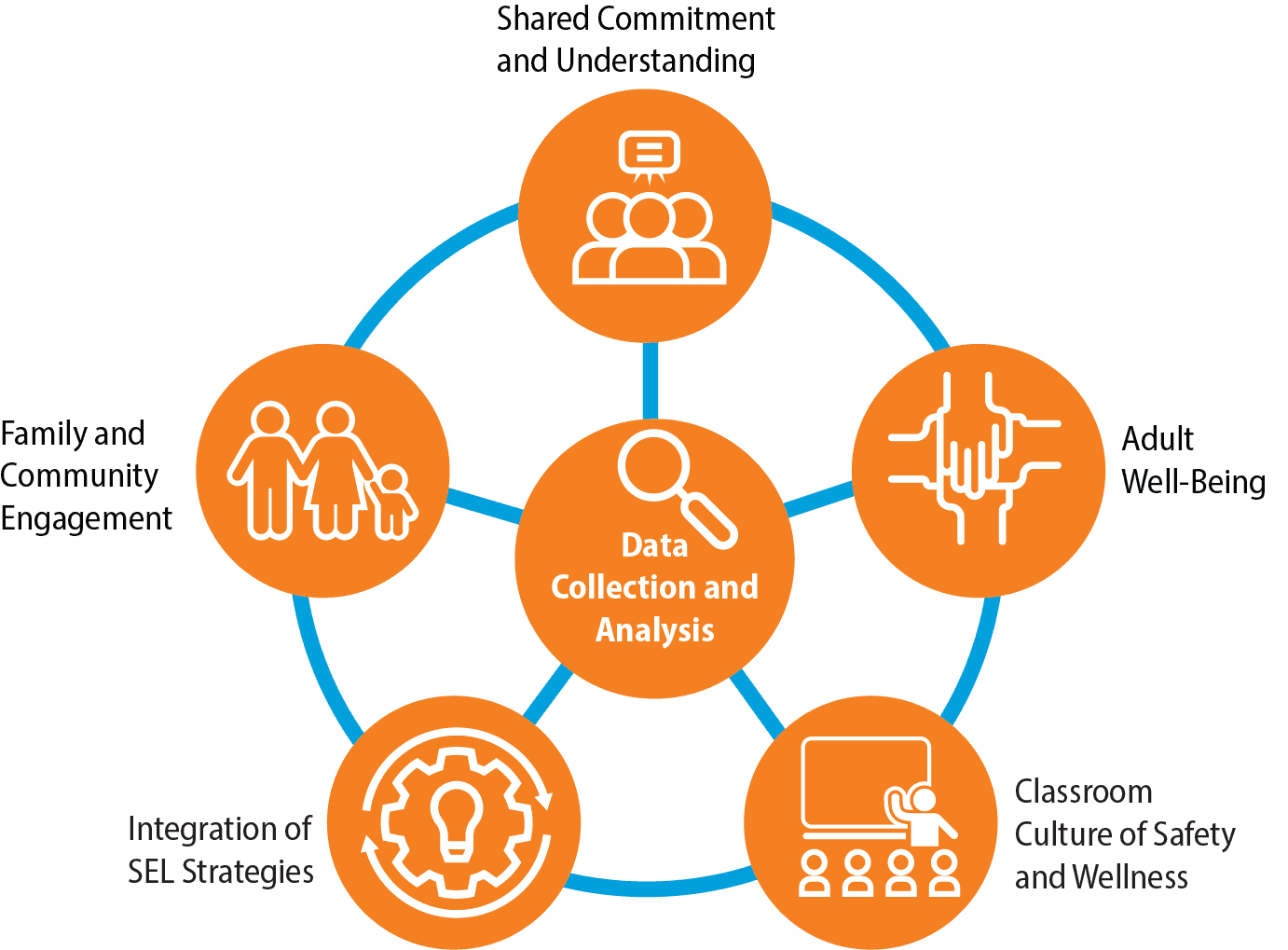Schools and educators play an important role in creating the conditions for students to locate and access adequate resources so that students can cultivate individual and community resilience to mitigate the effects of traumatic stress in challenging times. The Trauma-Sensitive and Resilient Schools strand of RTI’s Social and Emotional Learning Framework is designed to support schools and individual educators to strengthen their knowledge of trauma-sensitive practices and to promote mental well-being.
RTI offers customized technical assistance with an emphasis on:
| Types of trauma |
| Trauma’s impact on the brain |
| Adverse childhood experiences |
| Trauma and its impact on learning and relationships |
| Resilience of protective factors |
| Secondary traumatic stress |
| Educator self-care |
Trauma-sensitive schools understand trauma and its impact on schools and communities. RTI offers a series of workshops to raise awareness, promote resiliency and provide schools with strategies for practices and policies to build a trauma-sensitive environment. Participants will engage in interactive activities designed to create a safe and supportive environment such as individual reflection, scenario discussion, and group dialogue.
Workshops include:
- Leading Trauma Sensitive Schools
- Understanding Trauma and Its Impact (school level)
- Implementing Trauma Sensitive Practices
- Building Resilience in Students and Faculty

Resilient Schools Technical Assistance and Micro-Credential (Credentialing entity: RTI International). The Cultivating Resilience in Schools toolkit is intended to be used by school-based leadership teams, which include representation across all areas and stakeholder groups, to establish systems and structures for building resilient schools and learning communities. It should be used in consideration of contextual, cultural, and social factors unique to each organization and everyone within the organization. Technical assistance is based on the six components of the Resilient Learning Communities Framework (Figure 1).

Mental Health First Aid (Credentialing entity: RTI International). Youth Mental Health First Aid is designed to teach parents, family members, caregivers, teachers, school staff, peers, neighbors, health and human services workers, and other caring citizens how to help an adolescent (age 12-18) who is experiencing a mental health or addictions challenge or is in crisis. The course introduces common mental health challenges for youth, reviews typical adolescent development, and teaches a 5-step action plan for how to help young people in both crisis and non-crisis situations. Topics covered include anxiety, depression, substance use, disorders in which
psychosis may occur, disruptive behavior disorders (including AD/HD), and eating disorders (National Council for Mental Well-being). RTI instructors facilitate a full-day training to certify participants as Youth Mental Health First Aiders. The training includes YMHFA branded materials, pre-work, full-day of face-to-face or virtual training, and grading of course work for certification. All course work and certifications are provided through the National Council for Mental Well-being.
Project Examples
RTI partners with innovative schools, districts, states, and organizations to address education challenges. Here we highlight two of those partnerships.

Mental Health Service Professional Grant Program, Rural School Mental Health Training and Service Provision in Ashe County, North Carolina.
Ashe County Schools, a federally recognized Rural and Low-Income School district is partnering with RTI, Appalachian State University’s national experts in rural school mental health (SMH), and Watauga County Schools to address shortages in mental health care in rural northwestern North Carolina. Ashe County Schools will work with ASU’s doctoral program in clinical psychology to expand the capacity to meet the needs of its approximately 3,300 students in prekindergarten through grade 12. RTI will partner with Ashe County Schools and ASU to provide training and technical assistance to build the infrastructure to support system-wide improvement in the LEA. A second team of RTI SMH researchers at RTI will engage as independent, local evaluators for the project, providing feedback for improvement of implementation of the rural SMH model and the pipeline of future providers from ASU.

Mental Health Service Professional Demonstration Grant Program, Cumberland County, North Carolina
Cumberland County Schools (CCS), a federally recognized high-need local educational agency (LEA), has partnered with institutions of higher education (IHEs) Fayetteville State University (FSU) and University of North Carolina at Pembroke (UNCP), along with RTI International, to address shortages in school-based mental health (SBMH) care in Cumberland County, North Carolina. CCS will work with FSU and UNCP’s Department of Social Work and Department of Professional School Counseling to expand the capacity of the high-need LEA to meet the needs of its approximately 50,000 students in prekindergarten through grade 12 and to increase the number of students identified and connected to SBMH and community-based services
Mental Health & Trauma Experts
Our Education Services team is led by former teachers, principals, administrators, policy experts, and strategists who have the practical experience to translate ideas into action.

Fredrica Nash
Director
Center for Education Services
Fredrica Nash began her path toward education when selected to participate in the prestigious N.C. Teaching Fellow program. She spent the early years of her...
Expert in Social and Emotional Learning
Expert in Instructional Coaching

Ivy Mack
Education Consultant
Center for Education Services
Ivy Mack is an education consultant at RTI International whose expertise includes school-based mental health and multi-tiered systems of support. She began her...
Expert in School-based Mental Health
Expert in Multi-tiered Systems of Support
Resources
Questions?
Contact Education Services
at educationservices@rti.org